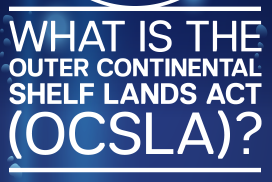
Blog
What Is the Outer Continental Shelf Lands Act (OCSLA)?
Posted in Jones Act
There are many maritime laws that protect workers on vessels in coastal and international waters. For those who work on stationary ocean structures, usually in the oil and gas or clean energy industries, the Outer Continental Shelf Lands Act offers similar protections.
What Is the Outer Continental Shelf?
The outer continental shelf, or OCS, is legally defined as “all submerged lands lying seaward of state coastal waters under U.S. jurisdiction.” These seaward lands under United States control typically begin three miles offshore1 of both coasts, into the Gulf of Mexico, and along the coasts of Alaska and Hawaii. A few states have coastal boundaries of up to nine miles, after which the OCS zone begins.
The outer continental shelf lands are rich in sea life, energy, and mineral resources, and they are home to many natural gas or oil platforms, drilling rigs, fish processing plants, and wind farms. Many individuals work and live on these stationary structures at sea.
The Outer Continental Shelf Lands Act
OCSLA was passed into law in 1953 to grant U.S. district courts original jurisdiction for cases connected with operations conducted on the outer continental shelf. It provides a legal process for disputes regarding exploration, development, and transport of natural resources in the area.
As part of the legislation, employees who work on the shelf were granted protections under the Longshoremen’s and Harbor Workers’ Compensation Act if they were injured or killed in the course of their duties.2 The law also appoints the Department of Interior (DOI) to grant or withdraw exploration rights or mineral leases on the continental shelf to prevent waste and conserve natural resources.3
The act has been amended several times. The first was in 1978, to allow cancellation of leases or permits in cases where the activity was causing harm to human or ocean life.1 It was amended again in 2020 to confirm that the Jones Act would apply to all offshore energy development employees on the outer continental shelf, including those in wind and alternative energy production.4
When Is a Worker Protected by OCSLA?
Workers on both permanent and temporary offshore structures may qualify for OCSLA protections if they are injured on the job. This includes workers on:
- Oil rigs
- Natural gas extraction facilities
- Floating drydocks
- Offshore wind farms
- Artificial islands used for resource exploration, production, or transportation
- Any installation or device on the subsoil or seabed in the OCS zone that exists to develop, produce, or transport resources
How Do the LHWCA and the Jones Act Come into Play?
The Jones Act traditionally applies to ships and vessels, but, due to the amendments, now applies to some injuries caused by negligence on structures used for developing natural resources on the continental shelf.
The OCSLA itself calls on the Longshore and Harbor Workers Compensation Act to add these workers to the class of people it protects, which also includes stevedores, ship fitters, dock workers, and others not covered under the Jones Act.
Together, these laws seek to protect maritime workers and provide basic benefits to those injured or killed in these dangerous environments. These protections include:
- Covering medical expenses
- Providing a portion of average weekly income while recovering from a job related injury
- Compensation for long-term disabling injuries and lost earning capacity
How to File a Claim Under the Outer Continental Shelf Lands Act
The OCSLA applies in specific circumstances:
- The worker was injured or became sick on a job site on the outer continental shelf, outside of state court jurisdiction.
- The job involved developing, removing, or transporting natural resources on the outer continental shelf.
- It is not necessary to prove anyone was at fault, or negligent, in causing that injury.
- Families of those killed on the job may be eligible to make claims for compensation.
In some situations, your claim might be better filed under the Jones Act if negligence occurred, or it may be filed directly under the Longshore and Harbor Workers Compensation Act. Given the complexities of maritime law, it may be wise to consult with an experienced team of attorneys familiar with how these laws interact.
Learning More About Filing an OCSLA Claim
If you have additional questions about the OCSLA or LHWCA, or other maritime laws that could provide compensation for personal injuries, please feel free to contact Maintenance and Cure, part of Schechter, Shaffer & Harris, L.L.P., to speak with one of our maritime lawyers. We offer a free consultation and case evaluation to help you determine how to move forward after an accident at sea.
To learn more about the OCSLA and the LHWCA, we invite you to continue reviewing and reading the following infographic.













